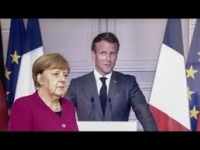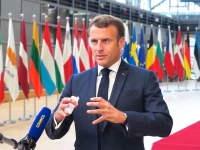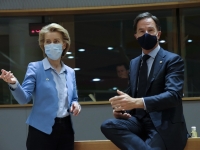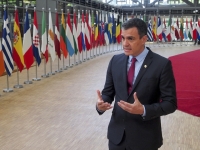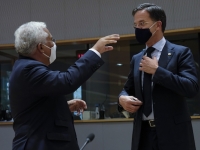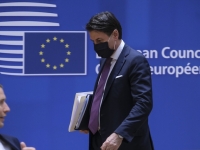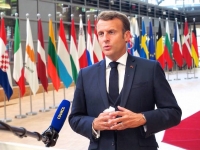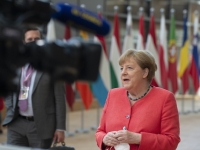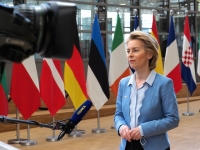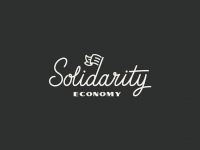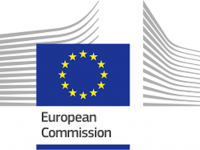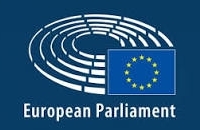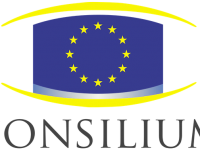Politics
ARM STANDOFF BETWEEN THE 4 FRUGAL & OTHER STATES EXTENDS WITH A POSSIBLE NO DEAL
ACCORDING TO CHANCELOR MERKEL
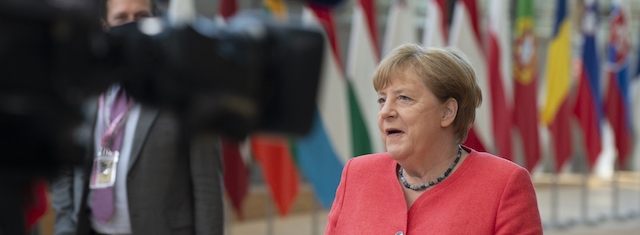
Chancellor Merkel Dorrstep European Council (Source: European Union)
USPA NEWS -
This special European council risks being historic, both for its longevity and the outcome of long and tense negotiations, questioning the principle of the founding texts of "solidarity" staging a boxing fight between the "Club des frugaux" against the rest of the EU, by successive rounds, until the opponent was exhausted, while they were boxing in the same category ... It is true that all European Summits do not resemble each other, because from this Friday July 17 , in Brussels, signs of an unprecedented character, reflected in the application of health barriers, the physical distancing of the leaders, the present reduced number of sherpas, and the wearing of the mask of the leaders, who have persisted to realize several meetings in open air ... while the Atrium room, which usually houses thousands of journalists from at least 27 European countries, is deserted ... while the last European summit, on June 19, which did not lead to any outstanding results was insipid e because was not the current boxing ring ...
MEMBER STATES ARE SUFFERING THROUGH THE WORST RECESSION IN ITS HISTORY AND FIGHTING OVER WHO SHOULD PAY MORE OR LESS
The challenges facing the 27 EU nations are formidable and might be historical, at this point of extra time for negotiations to reach ut a unanimous deal. The bloc is suffering through the worst recession in its history and member states are fighting over who should pay the most to help other countries and which nations should get the most to turn around their battered economies. In the largest room they could find at their summit center so they can keep apart as a health precaution. That's not the only way in which they are far apart ““ they are also a long way from one another on the subject of the meeting: plans for an unprecedented 1.85 trillion euro (2.1 trillion U.S. dollars) EU budget and recovery fund.-----------------------------------------
French President Emmanuel Macron led the early negotiations, arriving Thursday and using the the pre-summit hours to meet with Netherlands' Prime Minister Mark Rutte, a stringent budget hardliner and considered one of the biggest obstacles to reaching a deal at the two-day meeting. Sunday (D3) was marked by the speech at dinner, of the French President Macron, who raised his voice to denounce the ill will and « inconsistencies » of the frugal. « There was a very hard pass. Eventually, the President followed by German Chancellor Merkel banged his fist on the table said French source.
THE GROSS DOMESTIC GDP OF EU IS EXPECTED TO FALL FROM 7,5 TO 10 PERCENT IN 2020
The gross domestic GDP of the EU is expected to fall from 7.5% to 10% in 2020 and in particular for the countries of southern Europe, the most vulnerable, which are Italy, Spain and Greece.
As for the nineteen countries of the euro zone, the economy should contract even more (- 7.7% in 2020 and + 6.3% in 2021), given the relatively high weight of the countries of the South within it. .
The OECD places France among the four European countries most severely affected by the health crisis. French GDP would fall by 11.4% this year in the best case and 14.1% in the event of a second wave. According to recent forecasts (June 2020) from the Organization for Economic Co-operation and Development (OECD), published on Wednesday, Spain (-11.1%), Italy (-11.3%), the United Kingdom (-11.5%) and France (-11.4%) will see their gross domestic product (GDP) fall by more than 11% this year in the best of cases. And in a case of a second-wave scenario by the end of the year, the OECD forecasts GDP to fall to around 14%. The United States (-7.3% and -8.5%) and Germany (-6.6% and -8.8%) are resisting a little better. In either case, "never, in the history of the OECD, created 60 years ago, have we seen global growth downward to such an extent," exclaimed the secretary. General of the Organization, Angel Gurria, at the press conference. All of the Organization's member countries are in recession. And world trade, which was stagnant before the crisis, will contract between 9 and 12% this year, predicts Angel Gurria. (Source: OECD)
NO DEAL WAS REACHED OUT AFTER THREE DAYS OF NEGOTIATIONS THAT WILL CONTINUE
After three days of intense negotiations, the President of the European Council Charles Michel invited the Twenty-Seven to meet on Monday from 4 a.m. to resume discussions. Plenary sessions, bilateral meetings, very early mornings
Charles Michel, will present to the leaders a third compromise proposal on which the experts are working day and night to keep the pace. Several consultations between certain leaders, Charles Michel, President of the European Council and Commission President Ursula Von der Leyen have also been scheduled overnight, as well as bilateral talks between President Macron and Chancellor Merkel. The sticking point of negotiation comes from the "4 frugal countries" with the Netherlands in mind, Austria and Sweden, Denmark and Finland ... who veto. Knowing that the execution of the mechanism of this financial rescue plan requires the unanimity of the 27 Member States. The European Commission, for its part, also considers that the EU Treaty excludes any rule of unanimity in this area. lay down conditions in particular of "As for the Italian Prime Minister, Giuseppe Conte, whose country has been most impacted by the COVID-19 crisis, he declared: "Such a veto would be unacceptable, both from a legal and political point of view".------------------------------------------------------------------------------
Legally, it would be interesting to ask the legal possibility of individually issuing an "emergency brake" in the mechanism of the recovery plan which would allow a Member State to block the aid granted to a country in case of doubt on its program of economic recovery, like the resumption of reform or respect for the rule of law, as required by the 4 frugal.
This "frugal" state could then request that the contested program be raised "within three days" by the European Council or Ecofin. This would call into question the very notion of solidarity between the Member States, is even the central principle, even appears as a "common value" This solidarity, which seems to weaken when times get tougher (as was the help of the rescue lan vis-Ã -vis Greece crisis following the subprime crisis of 2008), does it not prove to be justly paradoxical, faced with a Europe, which itself slashes itself, as soon as it is a question of voting unanimously towards the countries in greatest difficulty?
THE MOST PRECIOUS VALUE OF EUROPEAN UNION IS THEORETICALLY BASED ON SOLIDARITY----------------
This same concept is invoked both as a condition of order and social cohesion, as the objective of all the firing of European institutions, and as the justification for the political and economic action of the Member States, pronouncing the ambition of a sovereign.------------------------------------------------------------------------------------------------------------------------------------------
It is in the same name of this principle or essential value of the founding texts that solidarity is invoked in the form of "a spirit of solidarity" at the service of European construction and which allows some to justify the budgetary transfers and the policies which are linked to this founding spirit of solidarity. This is why the current negotiation of the current European Special Council (which could prove to be in many respects historic), the failure of which, would call into question this fundamental value of "spirit of solidarity" which characterizes the Union. European, in all that it reflects, in the eyes of the rest of the world. On the other hand, if the negotiation, as laborious as it presents itself, proves to be fruitful, in favor of a win-win balance for all the Member States, crowned with a unanimity of the principle of the mechanisms of the Recovery Plan, then , the European Union will have proved to the rest of the world that it is capable of applying its main value: solidarity and at the same time asserting its sovereignty. On the side of other Member States weakened by the COVID-19 crisis such as Italy and Spain, and the leading countries, which are France and Germany, initiated this European Recovery Plan of May 20 last, jointly announced by President Macron and Chancellor Merkel ... The showdown was provision would reassure the "frugal" (Netherlands, Sweden, Austria, Denmark, Finland) and, above all, the Dutch Prime Minister Mark Rutte. It would amount to giving each State a right of veto over the programs for the resumption of reforms and the application of laws according to the principles and values “‹“‹of the Rule of Law.
European Council Charles Michel Ursula Von Der Lyen Commission Parliament President Emmanuel Macron Chancelor Angela Merkel Mark Rutte Pm The Netherlands Recovery Plan Covid-19 Rahma Sophia Rachdi Jedi Foster
Liability for this article lies with the author, who also holds the copyright. Editorial content from USPA may be quoted on other websites as long as the quote comprises no more than 5% of the entire text, is marked as such and the source is named (via hyperlink).

